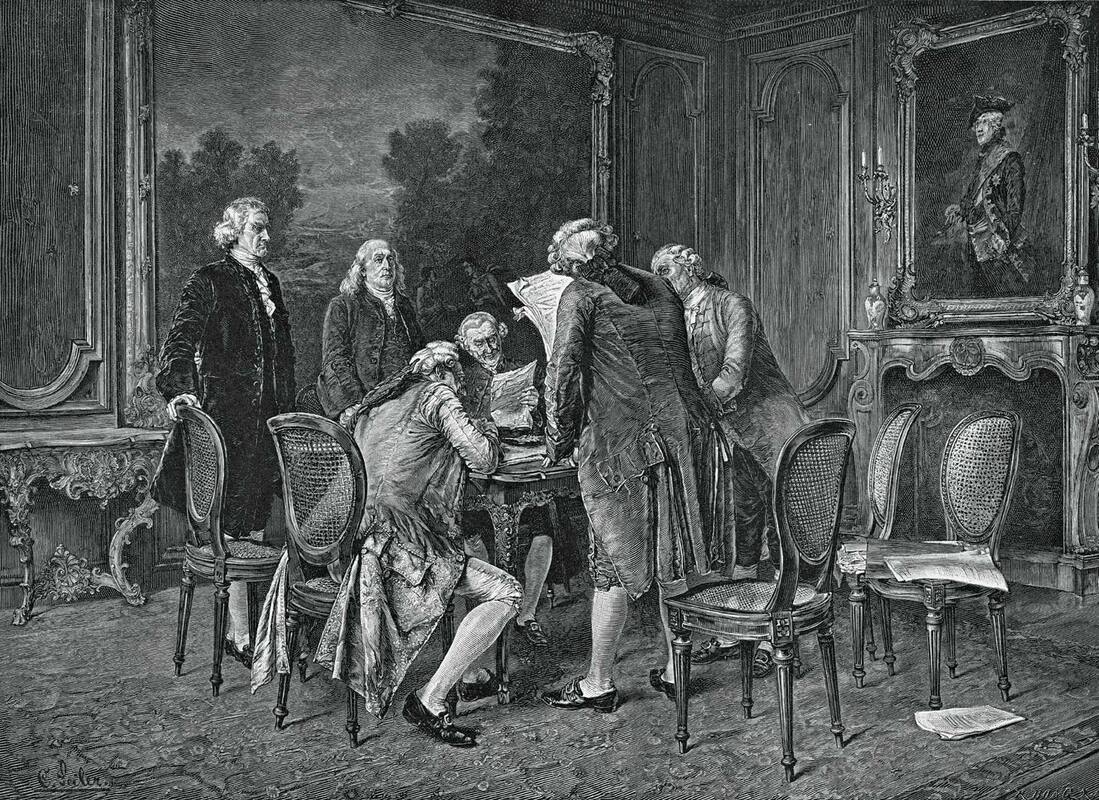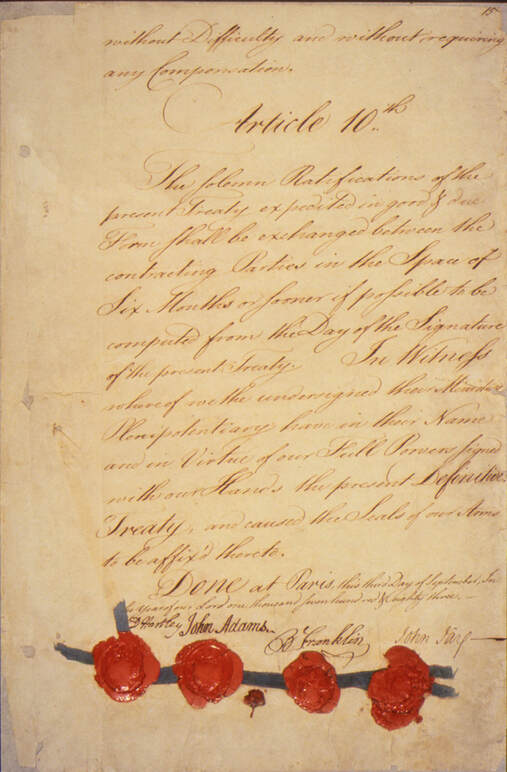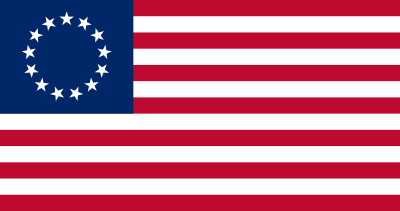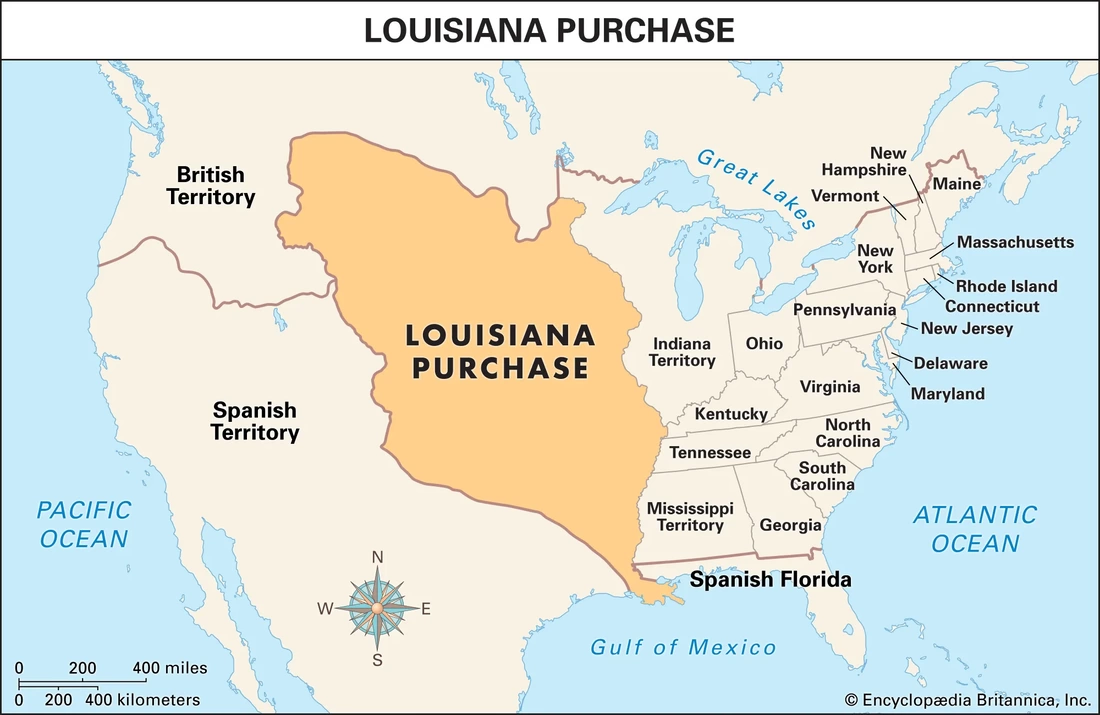Lesson 9 - What happened after the war of independence?
|
The Treaty of Versailles, 1782
In November 1782 a peace treaty was signed at the French king’s palace at Versailles. The first Article of the Treaty stated: His Britannic Majesty acknowledges the said United States. ..to be free sovereign and independent states, that he treats with them as such, and/or himself, his heirs, and successors, relinquishes all claims to the government, propriety, and territorial rights of the same and every part thereof The Treaty came into effect a year later. On 25 November 1783 George Washington entered New York, as the last British troops left America. He then gave up his command of the army and returned to his plantation in Virginia.
|
The American Constitution
Once the British left, the thirteen colonies had to decide how they would govern themselves. Should they have a king or a president, and how much power should they give him? The political ideas of the Enlightenment proved to be very influential. (See lesson 2)
Once the British left, the thirteen colonies had to decide how they would govern themselves. Should they have a king or a president, and how much power should they give him? The political ideas of the Enlightenment proved to be very influential. (See lesson 2)
It took them six years to work out a new Constitution (a set of laws for governing a country). It took a long time because the 13 states could not agree. Should the bigger states have more power than the smaller states? Should there be one representative assembly or two? Who should have tax raising powers? In 1787, one of the most extraordinary meetings of all time took place in Philadelphia. The outcome, was very unexpected:
|
|
Here are some of the points in the American Constitution:
Importantly, each of the three political bodies was meant to act as a check on the others, in order to prevent a concentration of power in any one of them. This is referred to as the checks and balances of the constitution.
President Washington
After the Americans agreed on the Constitution, they invited Washington to be the first President of the United States in 1789.
- The head of the government would be the president. He was to be elected and to hold office for four years.
- There were to be two Houses of Congress (parliament): the House of Representatives to represent the people (elected every two years), and the Senate (one third elected every two years) to represent the states (formerly the colonies). Congress was to make laws and approve taxes.
- The Constitution guaranteed human rights to citizens. These included the right to free speech, to a fair trial and to freedom of religion.
- A Supreme Court would make sure that all laws passed agreed with the Constitution.
Importantly, each of the three political bodies was meant to act as a check on the others, in order to prevent a concentration of power in any one of them. This is referred to as the checks and balances of the constitution.
President Washington
After the Americans agreed on the Constitution, they invited Washington to be the first President of the United States in 1789.
The French give up their claims - Merci Napoleon
|
In 1803, President Thomas Jefferson, motivated by strategic considerations and the desire for westward expansion, negotiated the acquisition of a vast territory from France. The Louisiana Purchase, finalized on April 30, 1803, doubled the nation's size, spanning around 828,000 square miles from the Mississippi River to the Rocky Mountains and from the Gulf of Mexico to the Canadian border.
Driven by the need to secure access to the crucial port of New Orleans and foster American territorial growth, Jefferson's administration struck a deal with French leader Napoleon Bonaparte. The United States paid $15 million, roughly four cents per acre, for this expansive land. This historic transaction not only provided fertile grounds for agricultural development but also set the stage for westward expansion, shaping the nation's destiny. |
The USA in the world - The Monroe Doctrine.
As early as 1783 the United States adopted the policy of isolation and announced its intention to keep out of Europe affairs. Ironically it was helped in this by Great Britain which was keen to prevent any rival European powers from intervening in its trading relationship with the USA. In the first years of its independence, the USA depended on the British navy to protect its independence. By 1823 the USA was ready to pronounce on its relationship with the rest of the world.
The Monroe Doctrine was a policy statement issued by President James Monroe in 1823 that declared the United States' opposition to any further colonization or any other kind of European intervention in the affairs of the newly independent nations of the Western Hemisphere. The doctrine was issued in response to the increasing activity of European powers in the region, particularly the efforts of Spain and Russia to reassert control over their former colonies.
The Doctrine stated that the Western Hemisphere was no longer open for colonization and that any attempt by a European power to establish a colony or interfere in the affairs of the newly independent nations would be seen as a threat to the United States. The Doctrine also stated that the United States would not interfere in the internal affairs of European nations.
The Doctrine was seen as a significant assertion of American power and influence in the region and helped establish the United States as a dominant player in the Western Hemisphere. It also helped to discourage further colonization and European intervention in the region and played a role in shaping the modern political landscape of the Americas.
As early as 1783 the United States adopted the policy of isolation and announced its intention to keep out of Europe affairs. Ironically it was helped in this by Great Britain which was keen to prevent any rival European powers from intervening in its trading relationship with the USA. In the first years of its independence, the USA depended on the British navy to protect its independence. By 1823 the USA was ready to pronounce on its relationship with the rest of the world.
The Monroe Doctrine was a policy statement issued by President James Monroe in 1823 that declared the United States' opposition to any further colonization or any other kind of European intervention in the affairs of the newly independent nations of the Western Hemisphere. The doctrine was issued in response to the increasing activity of European powers in the region, particularly the efforts of Spain and Russia to reassert control over their former colonies.
The Doctrine stated that the Western Hemisphere was no longer open for colonization and that any attempt by a European power to establish a colony or interfere in the affairs of the newly independent nations would be seen as a threat to the United States. The Doctrine also stated that the United States would not interfere in the internal affairs of European nations.
The Doctrine was seen as a significant assertion of American power and influence in the region and helped establish the United States as a dominant player in the Western Hemisphere. It also helped to discourage further colonization and European intervention in the region and played a role in shaping the modern political landscape of the Americas.
We owe it, therefore, to candor and to the amicable relations existing between the United States and those powers to declare that we should consider any attempt on their part to extend their system to any portion of this hemisphere as dangerous to our peace and safety. With the existing colonies or dependencies of any European power, we have not interfered and shall not interfere. But with the Governments who have declared their independence and maintained it, and whose independence we have, on great consideration and on just principles, acknowledged, we could not view any interposition for the purpose of oppressing them, or controlling in any other manner their destiny, by any European power in any other light than as the manifestation of an unfriendly disposition toward the United States.
The Monroe Doctrine, 1823
Activity
You will need to have watched the films in order to fully answer the following questions.
1. Which Enlightenment thinkers do you think most influenced the ideas contained in the US Constitution?
2. What was different about the US constitution compared to previous government under the 'Articles of Confederation'?
3. How was the US constitution meant to prevent future 'tyrannical' government? (Clue - separation of powers)
4. How did the US constitution protect the rights of the states and the rights of the rich landowners? (Clue - the electoral system)
5. What was the Louisiana Purchase and why was this important to future American development?
6. Explain briefly what the Monroe Doctrine set out to achieve.
You will need to have watched the films in order to fully answer the following questions.
1. Which Enlightenment thinkers do you think most influenced the ideas contained in the US Constitution?
2. What was different about the US constitution compared to previous government under the 'Articles of Confederation'?
3. How was the US constitution meant to prevent future 'tyrannical' government? (Clue - separation of powers)
4. How did the US constitution protect the rights of the states and the rights of the rich landowners? (Clue - the electoral system)
5. What was the Louisiana Purchase and why was this important to future American development?
6. Explain briefly what the Monroe Doctrine set out to achieve.




